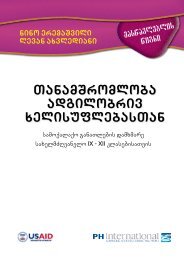The Geneva Protocol, by David Hunter Miller
The Geneva Protocol, by David Hunter Miller
The Geneva Protocol, by David Hunter Miller
Create successful ePaper yourself
Turn your PDF publications into a flip-book with our unique Google optimized e-Paper software.
CHAPTER XV. 59<br />
However, the question is of interest only from the point of view of the meaning of language; if the possibility<br />
should arise, it would doubtless be taken care of <strong>by</strong> the Council.<br />
Another and also comparatively unimportant point may be here noticed and that is in regard to the relations<br />
between the signatories to the <strong>Protocol</strong> and the Members of the League not signatory thereto, another phase of<br />
the temporary situation heretofore considered. As to this, it may be said very briefly that such relations would<br />
continue to be governed wholly <strong>by</strong> the Covenant. <strong>The</strong> Members of the League which do not ratify the<br />
<strong>Protocol</strong> could not during this temporary period be regarded as being in any way affected <strong>by</strong> what, as to them,<br />
would be in the nature of proposed amendments to the text of the Covenant itself. <strong>The</strong>se non-Signatories of<br />
the <strong>Protocol</strong> would therefore continue to look only to the Covenant for the regulation of their relations with<br />
any Member of the League. <strong>The</strong> <strong>Protocol</strong> does not contemplate a League within a League; it simply<br />
contemplates, during this temporary phase, a situation where certain Members of the League had assumed<br />
certain obligations without any constraint or effect whatever upon such Members as might not choose to<br />
assume them.<br />
<strong>The</strong> really vital question is as to the effect of the <strong>Protocol</strong> and of the Covenant upon non-Members of the<br />
League in their relations with Signatories to the <strong>Protocol</strong>.<br />
Even assuming that the plans now proposed for the admission of Germany to the League are carried out, there<br />
will remain for a considerable period two Great Powers, the United States and Russia, outside the League; and<br />
there are two other States of occasional international importance, the admission of which to the League is not,<br />
so far as I know, presently contemplated, these being Mexico and Egypt.<br />
Accordingly, the possible effect of the Covenant and the <strong>Protocol</strong> on non-Members of the League is one of<br />
very great consequence. It is a question which is being actively discussed in so far as it may have a bearing on<br />
the relations between Great Britain and the United States.<br />
{89}<br />
It is unquestionably true that the <strong>Protocol</strong> may have a real effect on non-Members of the League. Of course<br />
there is a legal formula which correctly says that a treaty cannot bind States not parties thereto, res inter alios<br />
acta; but even in the strictest legal sense this formula is only part of the truth in international matters. Any one<br />
who questions this will be convinced <strong>by</strong> reading Roxburgh's International Conventions and Third States.[2] A<br />
treaty between State A and State B may harm State C or it may benefit State C, as the Treaty of Versailles<br />
benefited Denmark <strong>by</strong> the cession of Slesvig, though Denmark was a neutral and not a party to the Treaty of<br />
Peace.[3]<br />
Let us consider the matter first from the point of view of the Covenant. <strong>The</strong>re are sanctions which may be<br />
applied under the Covenant and the application of these sanctions might affect a non-Member of the League<br />
either because they were applied against that particular non-Member or because they were applied against<br />
some other State.<br />
It is rather curious that this question has not been very much considered under the Covenant; interest in it has<br />
been greatly revived <strong>by</strong> the <strong>Protocol</strong>; but the possible realities under the Covenant are, it seems to me, in some<br />
respects more important than those under the <strong>Protocol</strong> alone.<br />
In considering this question it is well to look at it from the concrete point of view with a specific instance or<br />
example before us.<br />
<strong>The</strong> sanctions of the Covenant[4] are an economic and financial blockade. <strong>The</strong>se sanctions may be applied<br />
either as against a Member of the League which resorts to war contrary to the provisions of the Covenant or<br />
they may be applied against a non-Member of the League which resorts to war against a Member after
















